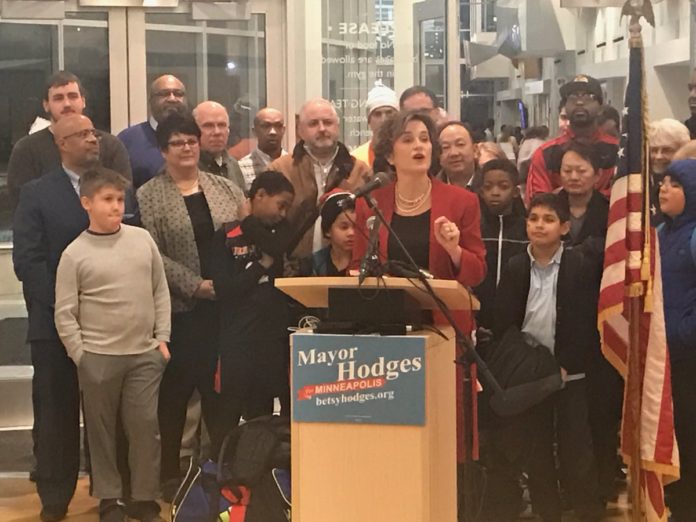“I refuse to give up on the longer-term goal of a higher regional wage, even in the painful, new political context of Donald Trump and Republican control of Congress and the Minnesota Legislature.” ~ Minneapolis Mayor Betsy Hodges
Minneapolis, Minnesota Minneapolis Mayor Betsy Hodges will push for an increased minimum wage in Minneapolis this year, as long as tipped workers are protected. In a statement released Dec. 19, 2016, Hodges said:
It is clear that the Minneapolis City Council will pass some version of a city-only minimum wage in the first half of next year. It matters for the future prosperity of workers and businesses in the rest of our region and state that if Minneapolis is going to lead on minimum wage, we get it right. In the context of the dramatically changed state and national political landscape, I support a responsible, sustainable, single fair wage that does not penalize tipped workers.
This is a switch from Hodges’ previous position of only supporting a “regional approach,” which would to increase the minimum wage across the metro and/or statewide rather than just in Minneapolis. However, with the Republicans gaining control of the state legislature in November, Hodges realized her plan for a regional increase was unlikely, stating:
“However, with dramatic changes in the state and national political landscapes, it is clear that the path to passing a higher national, statewide, or regional minimum wage has become far narrower. Despite my preference for a regional approach, in this context — and because it is clear that the City Council is moving toward action — I am laying out a set of principles for passing a higher minimum wage in Minneapolis. These principles include not leaving tipped workers behind; sustainability across all sectors and industries in our city, including our vibrant restaurant sector; and doing no harm.”
Hodges released the statement on the heels of her announcement that she plans to run for reelection in 2017. Hodges is being challenged by Black Lives Matters activist Nekima Levy Pounds. Levy Pounds has stated that if elected, she would be an advocate for a $15/hour minimum wage.
One of the groups leading the $15/hour minimum wage is “15 Now.” The group contends that raising the minimum wage to $15/hour would “immediately raise wages for over 100,000 workers. Raising the wage floor would boost wages for several thousand workers paid above the minimum wage, and the raise would increase pressure on the rest of the region to follow the lead taken by Minneapolis workers’ victory. Raising the minimum wage to $15 would put $900 million per year back into the pockets of working people from big business, giving workers more to spend immediately in our local communities.”
Seattle, Washington, increased its minimum wage from $9.96 to $11.14 an hour last year; companies with over 500 employees will be required to increase the minimum wage to $15/hour in 2017, with smaller companies increasing to $15/hour by 2021. According to Tim Worstall, Forbes contributor, the effects of the jump to $11.14 an hour has impacted only 1500 people in the Seattle area. However, where the real effects are being felt are in the restaurant industry. Seattle Magazine reports the minimum wage hike has caused Seattle restaurants to close:
Though none of our local departing/transitioning restaurateurs who announced their plans last month have mentioned this as an issue*, another major factor affecting restaurant futures in our city is the impending minimum wage hike to $15 per hour. Starting April 1, all businesses must begin to phase in the wage increase: Small employers have seven years to pay all employees at least $15 hourly; large employers (with 500 or more employees) have three.
Since the legislation was announced last summer, The Seattle Times and Eater have reported extensively on restaurant owners’ many concerns about how to compensate for the extra funds that will now be required for labor: They may need to raise menu prices, source poorer ingredients, reduce operating hours, reduce their labor and/or more.
Washington Restaurant Association’s Anton puts it this way: “It’s not a political problem; it’s a math problem.”
Hodges has stated that an increase to Minneapolis’s minimum wage would not exempt tipped workers; if that is the case, given Seattle’s restaurant closures, how will that affect Minneapolis restaurants? Or will those business owners move out of Minneapolis into more business-friendly areas?
Please subscribe to Alpha News for updates on all Minnesota political news.
UPDATED 12/21/2016 5:43am
















